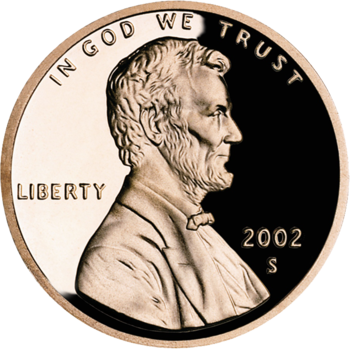I have two daughters and it has given me the pleasure of seeing them grow up and get excited about even the little things like chasing butterflies or finding a lucky penny. My kids find lucky pennies all the time. In fact, they find lucky coins all over the place. Some are by chance as we’re walking down the sidewalk and other times it’s a lucky coin that I may place in an inconspicuous place so they stumble upon it and find it (sometimes it’s fun creating luck for my kids).
Whether they find the coin by luck or otherwise, it gives me a great opportunity to teach them. After the excitement of the find goes away, they get even more excited when I ask, “Where should we put that lucky coin?” With glee they almost always reply, “In the piggy bank!”
I feel parents can teach their kids about money even if it’s starting with something as small as a penny. From lucky coins to birthday money it’s OK to teach your kids about saving a little bit, giving a little bit and spending some as well. I don’t think there’s too-young an age to start doing this. And by starting early, your kids will get excited about saving and this can potentially be less burdensome if they were to try at say – age 21.
Some readers may question how they can teach their kids about money or even feel that they can’t be effective teachers since they may not be as financially stable or literate as they would like. They needn’t worry. It’s an excellent way for parents to learn with their kids and they can both enjoy the benefits of working together. Parents can learn and then teach by example and simultaneously show their kids how to save.
As kids grow up, parents can then teach them how to save from the piggy bank to the savings account and even investments such as stocks, bonds and IRAs. Having been taught the basic fundamentals of just saving and not spending all their money, kids can learn the value of investing, and the miracle of compound interest.
Finally, teaching your kids about money ultimately empowers them to control their money, and not have their money control them. They’ll grow up seeing money as a tool, as a currency, and as an asset they can accomplish great things with – not as a conundrum, enigma, or something to worry or argue about – or worse, something they fear.



 Sterling Raskie, MSFS, CFP®, ChFC®
Sterling Raskie, MSFS, CFP®, ChFC® The latest in our Owner’s Manual series, A 401(k) Owner’s Manual, was published in January 2020 and is available on
The latest in our Owner’s Manual series, A 401(k) Owner’s Manual, was published in January 2020 and is available on  A Medicare Owner’s Manual, is updated with 2020 facts and figures. This manual is available on
A Medicare Owner’s Manual, is updated with 2020 facts and figures. This manual is available on  Social Security for the Suddenly Single can be found on Amazon at
Social Security for the Suddenly Single can be found on Amazon at  Sterling’s first book, Lose Weight Save Money, can be
Sterling’s first book, Lose Weight Save Money, can be  An IRA Owner’s Manual, 2nd Edition is available for purchase on Amazon. Click the link to choose the
An IRA Owner’s Manual, 2nd Edition is available for purchase on Amazon. Click the link to choose the  Jim’s book – A Social Security Owner’s Manual, is now available on Amazon. Click this link for the
Jim’s book – A Social Security Owner’s Manual, is now available on Amazon. Click this link for the  And if you’ve come here to learn about queuing waterfowl, I apologize for the confusion. You may want to discuss your question with Lester, my loyal watchduck and self-proclaimed “advisor’s advisor”.
And if you’ve come here to learn about queuing waterfowl, I apologize for the confusion. You may want to discuss your question with Lester, my loyal watchduck and self-proclaimed “advisor’s advisor”.
Hearing a story of compounding interest from a professor in college actually solidified my career choice as a financial advisor. I also have 2 daughters and am taking advantage of every opportunity to communicate about the bigger picture of stewardship. My oldest is only 3 years old but I began thinking about it when she was born as I describe here: http://buff.ly/1CIIIdd
The conversation has already started as she asks why I have to leave to go to work which opens up the opportunity to communicate the value of earning money and hard work. She now imitates me going to work on weekends from time to time and carries her Elmo purse so she can go get her money. It’s amazing what they pick up when you don’t even realize a lesson is being learned. Thanks for your story about the penny. Might have to use that as well!
Thanks, Chad! Appreciate the reply and will look at the link!